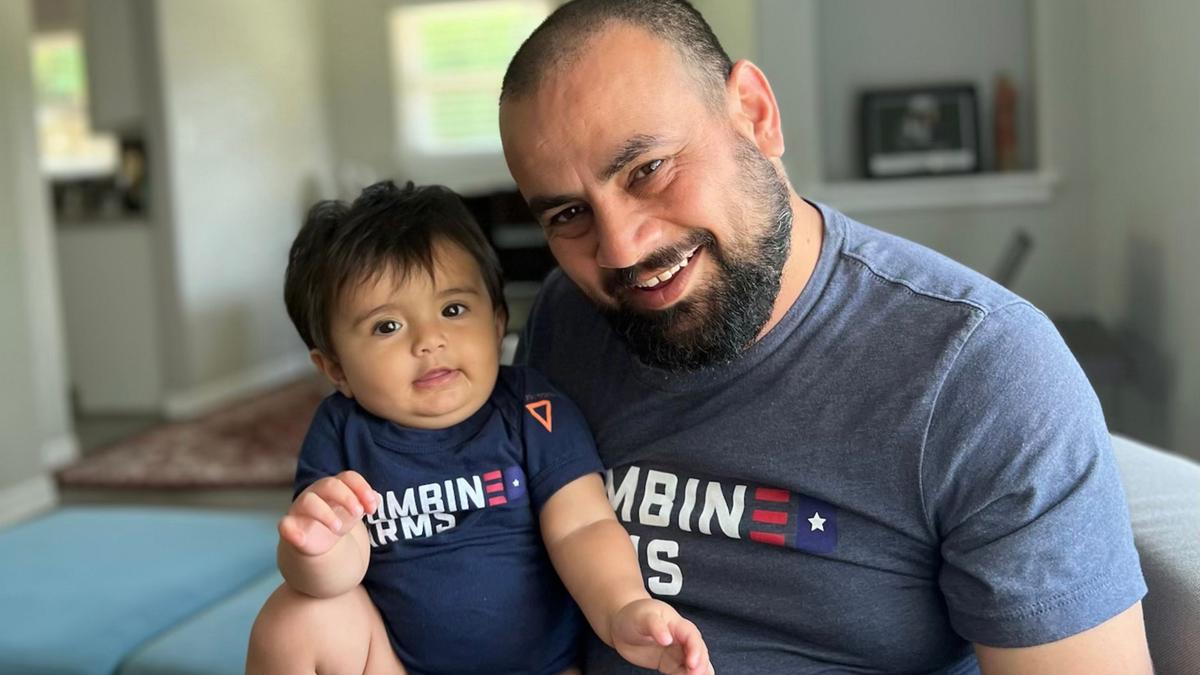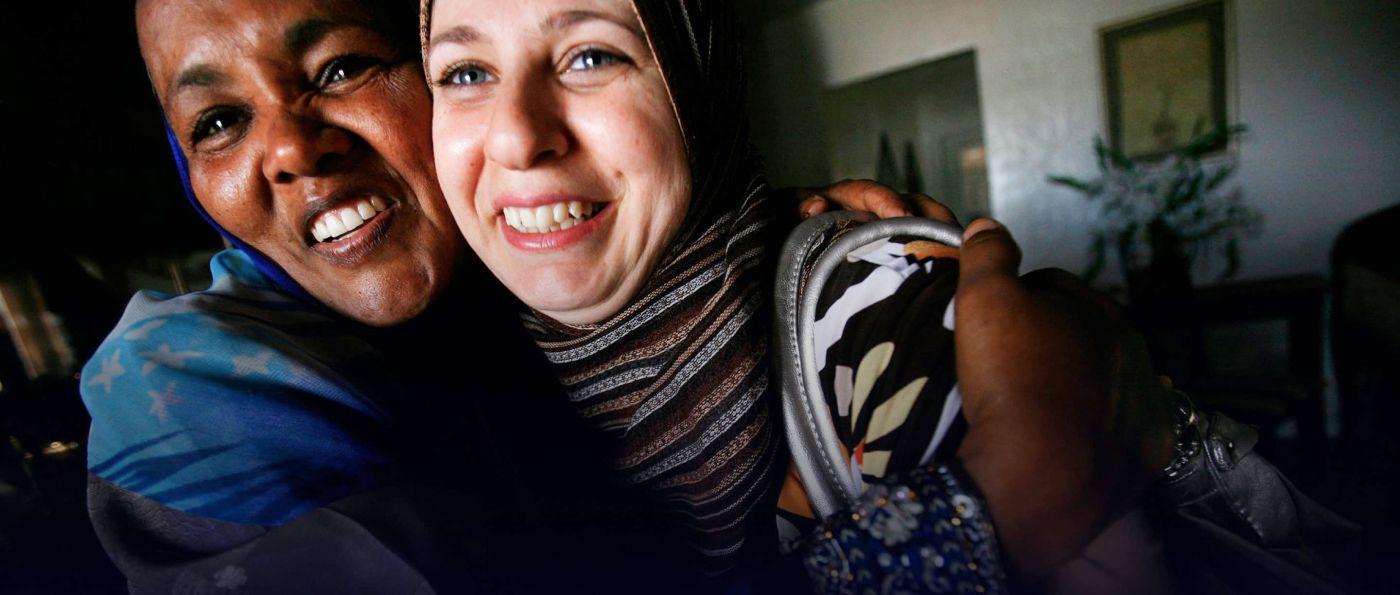

A Q&A WITH Ellen Smith, Keeping Our Promise, A WELCOME.US PARTNER
When the Taliban captured the city of Kabul in 2021, millions of Afghans were forced to evacuate their home country in search of safety. Many of our Afghan allies, who served alongside U.S. service members over the course of two decades, are still navigating the resettlement process. Ellen Smith, executive director of Keeping Our Promise, a Welcome.US partner and a Welcome Fund grantee, shares what their work looks like today as they continue supporting Afghan families who are building new lives in the U.S.
It has been three years since the fall of Kabul, and your work at Keeping Our Promise has seen no decline. Can you share more about the organization’s mission, and why it remains as important as ever today?
Our mission started in 2014 when a U.S. Army captain was seeking donations to help resettle his interpreter from Afghanistan. I didn't know him. He was on a friend's Facebook page, and he just needed kitchen items and living room furniture. I was all in on helping. I was working full time—I had no interest in doing this as work. And, it just really touched my heart.
When the family finally got here, they were scheduled to arrive in March 2014, and it was just inspiring how happy they were to be here and safe. The story I like to share is that their little daughter had on a ballerina sweater, and she was so adorable. All I could think of was, under the Taliban, she's not allowed to dance.
Two weeks later, I went back to meet with the family, and I was bringing them bicycles. The little girl was out on the balcony, waving her arms, and she's going, “Hello, lady! Hello, lady!” It's just like, oh my gosh, she's learned her first English, right? And they were so happy to get bicycles. The wife was so happy to get a bicycle. She was not allowed to learn how to ride a bike in the village that they came from—it was forbidden.
To see everything that this interpreter risked to work with our military to help try to build a different society… What they were risking is what touched my heart and started this mission.
When you just think of the sacrifices that all of these families made in this 20-year war, it really was a sacrifice that I think most Americans don't understand—and certainly I did not understand when I started this. It's hard as an American to wrap your head around the fact that you can't dance, you can't have music, you can't read poetry, right? Your wives now can't go shopping in Afghanistan. Your daughters can't be educated. So these are really hard things to think about, and what these folks were fighting for when we were there in the country…
People need to realize the evacuation hasn't stopped. When we pulled out of that country, there were over 100,000 Afghans that had worked for the U.S. or as a contractor who were left behind. And it's really important to understand that we are still able to get families out of Afghanistan. The war, in a sense, is not over in that there are still families for us to help.
What does comprehensive resettlement assistance encompass for a family coming to the New York area?
In terms of comprehensive resettlement assistance, we've gone from helping the local resettlement agencies to working on resettlement ourselves. Especially now, there's something called the virtual placement model, where families can come but someone needs to sponsor them and help them get started. Then, there's the sponsorship model through Welcome.US.
What we do with our services is find a house or an apartment [for a family]. We will pay their first month's rent and security. Although, I will tell you that it's typically more than one month of rent because of the back up of services for families to get TANF benefits, and that's the temporary aid that every single one of these families is entitled to get. The problems we're finding in our comprehensive services is having to support a family longer than we thought that we would have to help support them. Instead of just a month of rent, it's typically three months of rent.
We will furnish a house through donations, and we also get grants. We've been helped through [The Church of Jesus Christ of Latter-day Saints], the Mormon Church, on getting new beds for the families, as an example… We also partner with many churches and temples in our area to help support our families.
Ten years ago, what we saw was that, especially in Rochester, a family needed a car. Our buses, a lot of the routes don't have buses on Sundays. They have limited hours… We started a very simple program called Wheels for Work, and we would raise $3,000 for each family. They would have to do 100 hours of community service and volunteer—a very American thing—to get this grant. Then that would give them money to buy a car…
The other thing we do in our comprehensive services is, if a family or the head of household wants to go into a skilled trades program, we will continue to cover the difference between their [Department of Social Services benefits] and rent through that program. That training can last 6 to 9 months. It is quite a commitment on our part, but these guys come out making $25 to $40 an hour, and they will never go back on benefits, ever. Taking that extra 3 or 6 months past a traditional 90 days of a resettlement program is life changing.
How has the work evolved since the organization’s start in 2014?
The families that we are seeing now from Afghanistan—and I'm sure this is true for the Ukrainians—have a level of PTSD that we've just never had to deal with before. As a volunteer organization, we don't have the capability to deal with it. I was in a meeting with government officials last week, and there was a hotline that Afghans could call for mental health support run by Afghans. That funding is ending, and one of the things I begged for was for that funding to continue.
I know for our Afghans, they have been in hiding for three years, and their children have not been in school for three years, and their wives and daughters have not been able to leave the house for three years—or at least leave unaccompanied—and the level of PTSD is enormous.
The guilt of leaving the war zone or leaving Afghanistan is tremendous. Even as the executive director of this program, I don't know how to deal with it.
For my adult family members, each one of them gets a little heart [trinket]. When they get here, I'll take their hand and I'll put this heart in their hand. Then they look at it, and I tell them all to remember that they are here because they are loved, that they're here because someone really loves them.
It might be that soldier or that veteran that they were the interpreter for, or the person, the American they worked with in a [U.S. Agency for International Development] program—but they're here because they're loved.
What inspires you and your staff to continue this often challenging but crucial work?
The children—absolutely, the children. That's first.
I have 15 families who live near my office, and when I leave, the kids are riding their bicycles up and down the sidewalks, and they're running up and down the yards. Just to see them outside playing. The freedom—for me as a woman—especially for the little girls, to know that they are going to grow up not under the Taliban or not under ISIL [Islamic State of Iraq and the Levant]. I mean, that just does it for me… I am so happy to see that they have that freedom. The women, they'll gather together. They'll go to English classes together. I am just so happy that they are comfortable, doing that and knowing that they are safe.
The other thing that gets my heart are the veterans. Veterans come to me asking for help... To be able to tell a veteran that, yeah, we can look into your translator’s case. We can do that for you.
What have you heard from the families that you support about the impact of being welcomed by a community? How would you describe the impact?

In terms of how families feel, I think it's very important for everyone to realize that your first month is the hardest. Your first three months are the hardest. Your first six months are the hardest. Your first year is the hardest. But then, when you look back on year two or three, the families realize that maybe it wasn't as hard as they might have felt at that time. And they will be so appreciative of the support that the veteran volunteers or a program like this gave them, right?
For us, our doors are always open. A family can always walk in at any time and get help. And that's really important. It's a struggle in the first year—new culture, new job, new expectations… These are just things that you have to learn. That will make it harder when families are trying to adjust, and it's good for volunteers to realize what families are going through.
How can Welcomers support the work of Keeping Our Promise?
We do need financial help. Right now, we said that we would help 50 families in 2024, and we have surpassed that [in July]... We just can't offer the services that we've offered in the past.
We take designated donations, cars, or money for the Wheels for Work car grant program. We have an Amazon wish list for items that we need that we can give to families [like vacuum cleaners or pressure cookers].
These little things are really important to help the families settle in, and the finances, providing rent these days to cover the difference between DSS and what a family gets. DSS has not gone up since 2012, and a family of three only gets $732 a month for rent and utilities… You can't find an apartment with rent and utilities for that kind of money. It really is important that we raise those funds so we can pay that difference in what a family gets in their entitled benefits.
Even if you can't be a volunteer, you can help support these families by making a donation and helping out.
More stories of welcome





